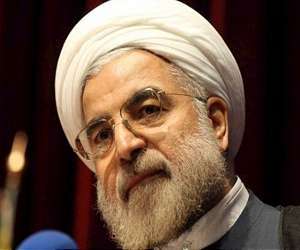Rowhani Firm on Iran Nuclear Rights but Vows Transparency
إقرأ هذا الخبر بالعربية
Iran's newly-elected president Hassan Rowhani ruled out on Monday any halt to the nuclear activity that has drawn U.N. sanctions but said he hoped an early deal could be reached to allay the concerns of major powers.
The moderate cleric, who won outright victory in Friday's presidential election on the hopes of millions for an end to the economic hardship caused by Western sanctions, pledged greater transparency in the long-running talks.
Rowhani, addressing his first press conference since winning the vote, said there would be no change in Iran's longstanding alliance with Syrian President Bashar Assad that has been the source of additional Western concern.
But he said he would seek to thaw relations with the key Gulf Arab backers of the rebels fighting to oust Assad's regime for more than two years.
Rowhani, who led the nuclear negotiating team under reformist former president Mohammad Khatami from 2003-5, said there could be no return to the moratorium on uranium enrichment that Iran accepted at the time.
"This period is over," he said.
When Rowhani stepped down, outgoing President Mahmoud Ahmadinejad resumed uranium enrichment, triggering successive U.N. Security Council ultimatums to suspend it, some of them backed up with sanctions.
Iran has since massively expanded its facilities for the enrichment of uranium, extending the process to 20 percent and raising the fears of regional foe Israel that the 90 percent required for a warhead is but a step away.
The 64-year-old Rowhani said that the EU and U.S. sanctions against Iran's oil and banking sectors that have sent the economy into freefall were unjust but promised transparent talks to try to resolve the underlying issues.
Iran will be "more transparent to show that its activities fall within the framework of international rules," he said.
"The idea is to engage in more active negotiations."
Rowhani has repeatedly promised to restore diplomatic relations with the United States, broken off more than three decades ago after the storming of the U.S. embassy in Tehran by Islamist students.
He has also expressed readiness for bilateral talks with Washington to allay its concerns that Tehran's nuclear program is cover for a drive for a weapons capability.
But he said those talks could not be without conditions.
"The U.S. should not interfere in our internal affairs, recognize the rights of Iran including nuclear rights and stop its unilateral policies and pressure," he said.
"The next government will not give up the legitimate rights of the country."
On a visit to Iran's western neighbor Iraq on Monday, the chief negotiator of the major powers, EU foreign policy chief Catherine Ashton, said she would take Rowhani up on his promise of more constructive engagement.
"I will continue to do my work to urge Iran to work closely with me.., to build confidence in the nature of their nuclear program," she said.
Rowhani won Friday's election with more than 50 percent of the vote against a divided field of hardline conservatives.
He told supporters on Monday that he would do all in his power to bring about "the change" they desired after eight years of conservative domination under outgoing President Mahmoud Ahmadinejad.
"God willing, this is the beginning of a move that will bring the change demanded by the people in the fields of economy, culture, social and politics," he said, cautioning that could not happen "overnight."



